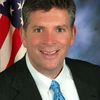Garth Gullette
Garth Gullette (Republican Party) ran for election to the U.S. House to represent Illinois' 16th Congressional District. He will not appear on the ballot for the Republican primary on March 17, 2026.
Gullette completed Ballotpedia's Candidate Connection survey in 2025. Click here to read the survey answers.
Biography
Garth Gullette was born in Peoria, Illinois. He earned a high school diploma from Dunlap High School. His career experience includes working as an advocate.[1]
Elections
2026
See also: Illinois' 16th Congressional District election, 2026
General election
The primary will occur on March 17, 2026. The general election will occur on November 3, 2026. General election candidates will be added here following the primary.
Democratic primary election
Democratic primary for U.S. House Illinois District 16
Paul Nolley is running in the Democratic primary for U.S. House Illinois District 16 on March 17, 2026.
Candidate | ||
 | Paul Nolley | |
 = candidate completed the Ballotpedia Candidate Connection survey. = candidate completed the Ballotpedia Candidate Connection survey. | ||||
| If you are a candidate and would like to tell readers and voters more about why they should vote for you, complete the Ballotpedia Candidate Connection Survey. | ||||
Do you want a spreadsheet of this type of data? Contact our sales team. | ||||
Withdrawn or disqualified candidates
- Joe Albright (D)
- Brendyn Morgan (D)
- Scott Best (D)
Republican primary election
Republican primary for U.S. House Illinois District 16
Incumbent Darin LaHood is running in the Republican primary for U.S. House Illinois District 16 on March 17, 2026.
Candidate | ||
 | Darin LaHood | |
 = candidate completed the Ballotpedia Candidate Connection survey. = candidate completed the Ballotpedia Candidate Connection survey. | ||||
| If you are a candidate and would like to tell readers and voters more about why they should vote for you, complete the Ballotpedia Candidate Connection Survey. | ||||
Do you want a spreadsheet of this type of data? Contact our sales team. | ||||
Withdrawn or disqualified candidates
- Garth Gullette (R)
- John Kitover (R)
Endorsements
Ballotpedia is gathering information about candidate endorsements. To send us an endorsement, click here.
Campaign themes
2026
Ballotpedia survey responses
See also: Ballotpedia's Candidate Connection
Garth Gullette completed Ballotpedia's Candidate Connection survey in 2025. The survey questions appear in bold and are followed by Gullette's responses.
| Collapse all
- I’m not a politician—I’m a working parent who’s dealt with unaffordable housing and a system that overlooks everyday folks
- I’ve lived in Peoria County my whole life, raising kids here, and I’m tired of reps who won’t even hold town halls or be held accountable. Being an available voice for the voters should not be to much to ask.
- I’m all in on real change: no big donors, no party scripts—just listening to you and showing up. Let’s talk!
Housing affordability to end child homelessness and make homes secure.
Unacknowledged” (2017 documentary)
Beyond the thrilling plot, Hartley explores complex human emotions and the blurred lines between truth and perception, inviting readers to question what really lies in the shadows—both around us and within ourselves. If you value stories that combine intelligent storytelling with emotional weight and a hint of the mysterious, “Chasing Shadows” offers an unforgettable reading experience that lingers long after the last page.
True leadership means listening directly to the people and making decisions based on principle, not political careerism. Independent representatives are freer to stand firm against wasteful spending, unnecessary regulation, and government overreach. Voters deserve officials who prioritize their concerns and aren’t beholden to party machines or special interests.
Emerging threats such as cyberattacks, geopolitical rivalries, and unconventional warfare require a robust, adaptive defense strategy. The rise of near-peer competitors like China and Russia demands vigilant intelligence, technological innovation, and strong alliances. At the same time, transparency and oversight must ensure security efforts respect civil liberties and democratic principles.
2. Economic Stability, Housing Crisis, and Banking Reform:
The housing market teeters on the brink of collapse, with skyrocketing prices and limited affordability pushing many families, especially children, into homelessness and housing insecurity. This crisis is compounded by systemic issues within our financial system—particularly fractional reserve banking—which can fuel economic instability and inequality. Comprehensive banking reform and sound monetary policy are urgently needed to create a fairer, more stable economy that serves all Americans.
3. Political Polarization and Governance:
Deep political divisions threaten trust in democratic institutions and effective governance. Rebuilding confidence through transparency, accountability, and enhanced civic engagement is essential to maintain a functioning and united democracy.
4. Public Health and Social Services:
draw inspiration from John F. Kennedy’s visionary leadership and deep commitment to public service. Like JFK, I believe in putting the people first and demanding accountability from our government. Today, that means pushing for bold banking reform to fix the instability caused by fractional reserve banking and ensuring fairness for working families. I’m equally committed to housing reform to address rising homelessness and the looming housing market collapse. Above all, I stand for transparent, accountable government that serves the people—not special interests. This independent-minded approach guides my vision for a stronger America.
Because they make up everything.
Without compromise, legislative gridlock can prevent progress on critical issues, leaving important problems unresolved. When lawmakers work together and find common ground, they build trust and collaboration that strengthens democratic institutions. Compromise encourages pragmatic solutions focused on what can realistically be achieved, rather than rigid ideological purity.
However, compromise should not require abandoning core values or ignoring urgent moral issues—especially those involving justice, transparency, and human dignity. Effective governance requires balancing principle with practicality: standing firm on fundamental beliefs while remaining open to dialogue and negotiation.
Given my commitment to banking reform, I would push for revenue measures that promote financial stability, limit harmful speculative practices, and close loopholes that favor special interests over working families. On housing, I’d advocate for targeted funding that supports affordable housing initiatives and combats child homelessness, making sure resources reach those who need them most.
Given my commitment to financial transparency, banking reform, and housing affordability, I believe these powers should target uncovering waste, corruption, and abuse—whether in fiscal management, regulatory enforcement, or public programs. For example, probing the Federal Reserve’s policies or housing agencies can reveal shortcomings that harm working families and taxpayers.
House Committee on Homeland Security
House Committee on Oversight and Accountability
House Committee on Ways and Means
Fractional reserve banking allows banks to lend most deposits while keeping only a fraction in reserve, effectively creating new money as debt. While this system supports economic growth, it also causes boom-and-bust cycles and makes money supply dependent on debt. Since all new money is debt-based, borrowers must repay with interest, which concentrates wealth and perpetuates indebtedness.
The Federal Reserve manages monetary policy by adjusting interest rates to control inflation and employment. However, it is not infallible — its policies can slow growth and disproportionately hurt working families. Its independence and lack of full transparency make public oversight essential.
Interest payments create a cycle where more borrowing is needed to cover previous debts plus interest, which can trap individuals and governments in financial hardship—effectively making people “slaves” to debt. Today’s high interest rates, intended to fight inflation, increase the cost of mortgages and loans, making economic mobility harder for many.
Note: Ballotpedia reserves the right to edit Candidate Connection survey responses. Any edits made by Ballotpedia will be clearly marked with [brackets] for the public. If the candidate disagrees with an edit, he or she may request the full removal of the survey response from Ballotpedia.org. Ballotpedia does not edit or correct typographical errors unless the candidate's campaign requests it.
Campaign finance summary

See also
2026 Elections
External links
Footnotes
- ↑ Information submitted to Ballotpedia through the Candidate Connection survey on August 11, 2025







